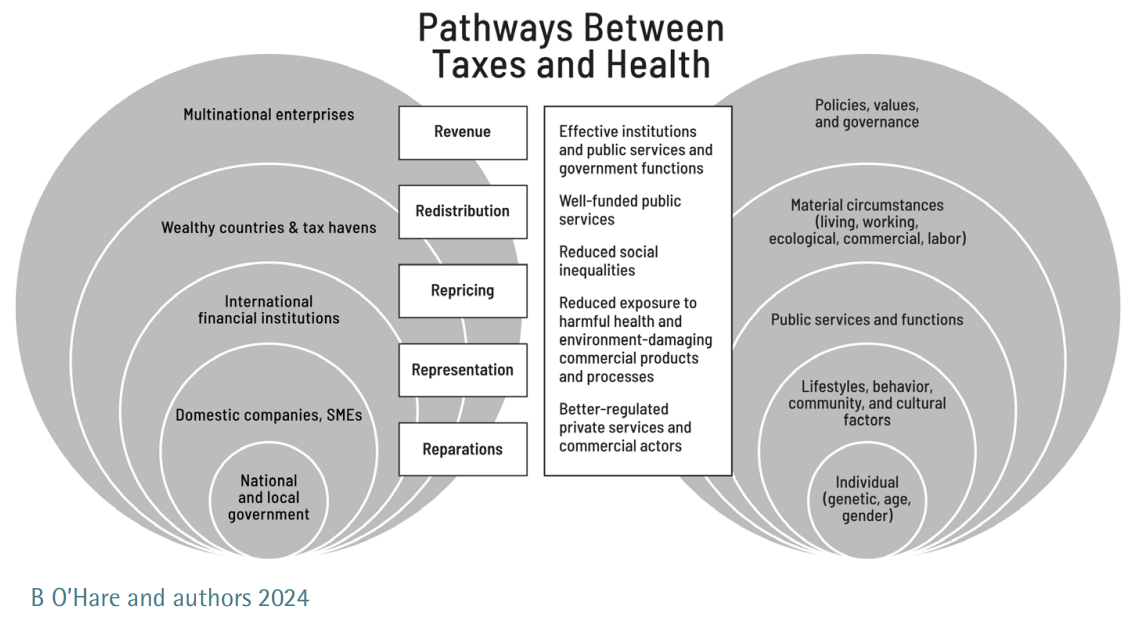




Dr Bernadette O'Hare, Dr Rene Loewenson, Rachel Etter-Phoya, Grazielle Custódio David, Dr Hannah Eilish ■ Money can’t buy health, but taxes can improve healthcare

No one likes going to the doctor. When you’re guaranteed a neighbourhood health system with community health workers, and a clinic close by with medical staff on duty, reliable electricity and water, and medicines available, it’s one thing. However, for those people living with failing, poorly designed or underfunded healthcare systems, waking up in the middle of the night with a feverish child is a nightmare.
Having enough money in your pocket doesn’t change this situation either. And most people who have the greatest health needs don’t have enough money in their pockets to pay for expensive private care. In contrast, enough money in the government’s public purse would make all the difference. Governments can finance better public healthcare systems, train, employ and equitably distribute more staff, and build the necessary infrastructure, so that more people will live longer, healthier lives.
Government spending accounts for the lion’s share of total healthcare spending globally, well beyond private healthcare provision, but governments need enough money. Taxes are crucial for making sure countries have the necessary resources. However, the pathway between taxes and better healthcare is not always clear, especially outside the world of tax justice.
This is why a group of us – researchers and health activists – mapped out how tax justice can make all the difference in improving health in our recent contribution to the Global Health Watch 7, the People’s Health Movement’s flagship publication. This provides critical and affirmative content on the political economy, health system, and wider issues that affect health today to inform the activist mobilisation for health justice that the current situation demands.
The pathways between taxes and health
Taxes can transform society and healthcare when the five principles of tax justice, or the 5Rs, are active in tax systems. Tax is about far more than raising revenue. Briefly, these are
- Revenue: When used as a force for good, taxes raise revenue for governments and public services to function, constituting 70-85 per cent of total government revenue. The remainder comprises social contributions, grants and other non-tax revenue, such as licenses, fees and fines.
- Redistribution: Fairer tax systems help redistribute wealth to address inequalities by ensuring that larger, wealthier taxpayers pay more than the lowest-income people, households and small, informal enterprises. It works by pooling tax revenue to finance universal benefits and services, such as public healthcare, for people based on real need rather than their ability to pay. Taxes are fundamental for funding universal public sector health services that comprehensively provide accessible prevention, care and rehabilitation, free for people at the point of access. Well-funded public services are the most effective way to redistribute resources from high-income to low-income groups and from low to high health risk groups.
- Repricing: We can design taxes to ‘reprice’ or discourage and limit the social, environmental, and economic costs of health-harming products, such as fossil fuels, tobacco, alcohol, and ultra-processed foods.
- Representation: When taxation underpins the social contract between public representatives and populations and provides mechanisms for effective participation in planning, it helps build effective states and democratic accountability.
- Reparations: Although reparations through the tax system cannot meet the cost of historic colonial or ongoing capitalist plunder, extraction and climate damage, they could contribute to a transition away from an extractive economy towards a regenerative economy and fund necessary reparations.
A picture of the pathways between taxes and health
We created a diagram to explain the links, or pathways, between taxes and health.
The left-hand circle illustrates the key global influences on national policies. For example, a multinational enterprise may avoid taxes, which reduces the government revenue available for public services.
The right-hand circle represents the broader determinants of health, which are directly impacted by the five principles of tax justice. For example, the number of people smoking is, to some extent, determined by a government’s policy on taxing tobacco, which multinational enterprises may influence.
The central boxes illustrate the principles of tax justice and their potential positive impact. However, the current international financial system and influential global and national actors often undermine these principles.

Stealing taxes sickens society
Taxes may be society’s superpower. Yet deep historic and structural global injustices mean that governments are often unable or unwilling to generate and allocate taxes in ways that dismantle inequalities effectively.
Tax injustice takes many guises. Tax abuse costs the world an estimated $492 billion in lost tax revenue every year. This happens when multinationals shift profits to tax havens, away from where they do business, extracting resources, marketing digital products, and employing people, and when wealthy individuals stash their money offshore to hide it from the tax collectors where they live or generate income.
Tax havens enable this plunder. People avoid paying taxes and use these havens to circumvent criminal laws, transparency requirements, financial regulation, and more. The biggest enablers of tax abuse are not the small palm-fringed island havens that we commonly imagine. Instead, the Tax Justice Network demonstrates that,
The UK and its dependent territories (aka the UK’s “second empire”) are responsible for 23 per cent of the corporate tax losses. The “axis of tax avoidance” (the UK and its second empire, plus the Netherlands, Luxembourg and Switzerland) are together responsible for 33 per cent. In total, OECD member countries and their dependencies account for more than 6 of every ten dollars lost.
The State of Tax Justice 2024
Tax injustice infringes on the lives, rights, and well-being of the vast majority of people and further marginalises already-discriminated groups. Using conservative estimates of tax losses, equivalent to just under 2% of government revenue, Malawi suffers at the hands of multinational companies and wealthy individuals offshoring their profits and wealth. The losses are equivalent to:
- 12,000 not having access to basic water every day
- 20,000 Malawians not having access to basic sanitation every day
- 5,000 children not attending school every day
- 150 children not living beyond the age of 5 every year
- 10 mothers dying in childbirth every year
Taxes save lives
Countries can and must use their tax superpowers. If Nigeria had the equivalent tax revenue it loses each year because multinational companies shift their profits, 11 more Nigerian children would survive each day.
But what changes can countries make? Tax belongs to the people, so ‘Any reversal [of tax injustice] is most likely to start from the bottom up, with taxpayers becoming the key drivers of change’, as the Tax Justice Network Africa makes clear. Populations and taxpayers have the right to know and have information on how taxes are collected, where they are being levied, and how this affects them. Practically, governments should regularly publish revenue data and tax expenditures and disclose all agreements and treaties that affect revenue.
Fairer taxation is essential to fill the health financing gap for public sector health systems, including for universal coverage. Policies must promote equity between individuals with different incomes (vertical equity), ensuring that they benefit poorer groups. Countries should reject tax exemptions that reduce direct taxes on products that harm health, including gambling, tobacco and alcohol, or exempt selected sectors from taxes that fund health as an incentive for investment.
Building domestic capacity within revenue authorities to address tax abuse and expanding the tax base through taxing wealth and other fairer taxes will raise revenue, rather than focusing on the never-ending task of broadening the tax base by registering people who already survive on the bare minimum.
Regional collaboration is necessary to stop the race to the bottom in tax and reduce unnecessary tax exemptions for corporations that sweeten the deal for companies but are unnecessary for investment, and reduce a country’s tax revenue. Regional bodies like the African Tax Administration Forum in Africa and the Regional Platform for Tax Cooperation in Latin America and the Caribbean (PTLAC) are strengthening regional cooperation on tax matters. They also act as powerful blocs in international spaces, which, of course, reinforces their voices in a place dominated by economically powerful nations.
This brings us to the exciting period we are witnessing – the negotiations of a once-in-a-century opportunity for a United Nations tax convention. Why hasn’t this been in place before, you might wonder? The short version is that it’s a long story of the wealthiest nations, from the League of Nations through to the OECD, undermining efforts to better tax their multinational companies.
Reforming taxes in likely and unlikely places
The UN is more inclusive and representative, in contrast to the OECD’s domination in setting tax rules that benefit only their rich member countries (and even those rules are crumbling with recent developments in the US). In contrast, UN member states as signatories to international human rights treaties are legally bound to implement conventions. They are held accountable by UN bodies and can keep each other accountable transparently and in the public interest.
These new rules may emulate the ABCs of tax transparency, the Tax Justice Network has set out as part of the larger Global Alliance for Tax Justice. Initially dismissed as utopian, these measures formed the basis for global OECD-designed (but watered-down) tax transparency measures. They are now considered essential transparency rules supporting domestic enforcement so that tax authorities can audit corporations and trace untaxed offshore wealth, although there is still a long way to go.
Calls for international tax reform, and a shift to the UN as the place for rule-setting have become more urgent with the scale of global health challenges, including pandemics and the climate emergency. Leaving these challenges to dwindling overseas development aid and other forms of unpredictable or voluntary financing is problematic for the equity and sustainability in investment that these challenges urgently require.
Climate financing in the form of overseas development aid has failed to meet pledges or needs, with climate-related loans adding debt burdens to what are already inequitable climate burdens, carbon credit schemes using carbon markets while leaving the drivers of climate change unmanaged, and power left in the hands of high-income countries which are the primary drivers of the climate crisis.
Global influencers promoting tax transparency and tax justice, including redistribution, are emerging from unlikely places. A small but growing number of multinational companies voluntarily have Fair Tax Mark accreditation under the Global Multinational Business Standard, which signals that they abide by the principles of fair tax. This includes paying the right amount of tax (but no more) in the right place at the right time, according to both the letter and the spirit of the law. It also means companies are providing sufficient public information to enable their stakeholders to form a rounded and informed view of their beneficial ownership, tax conduct and financial presence (across the world if they are a multinational).
Wealthy individuals associated with the organisations Patriotic Millionaires and Millionaires for Humanity have asked to be taxed more on their assets and inheritance. In an open letter, millionaires and billionaires sent to leaders attending the World Economic Forum in Davos, Switzerland in 2022, they wrote, ‘As millionaires, we know that the current tax system is not fair… The world—every country in it—must demand that the rich pay their fair share. Tax us, the rich, and tax us now.’
Activist communities and engaged policymakers are already shaping a world to stem tax abuse, tax systems within and across countries are becoming fairer, and taxes are effectively contributing to healthier societies. However, corporate resistance to this growing movement is strong and comes from many sides, which is why more people working in the public health sector need to join the struggle.
- ‘Tax justice, a pathway to better health’ in Global Health Watch 7: Mobilizing for Health Justice by Rachel Etter-Phoya, Bernadette O’Hare, Rene Loewenson, Grazielle Custódio David, and Hannah Eilish
Related articles
The last chance
2 February 2026

The tax justice stories that defined 2025

Let’s make Elon Musk the world’s richest man this Christmas!

2025: The year tax justice became part of the world’s problem-solving infrastructure

Bled dry: The gendered impact of tax abuse, illicit financial flows and debt in Africa
Bled Dry: How tax abuse, illicit financial flows and debt affect women and girls in Africa
9 December 2025

The myth-buster’s guide to the “millionaire exodus” scare story
The elephant in the room of business & human rights
UN submission: Tax justice and the financing of children’s right to education
14 July 2025

